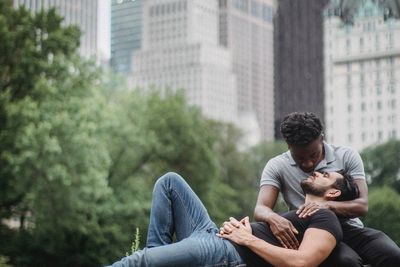LGBTQ people are significantly less likely to be homeowners - how to improve your odds
Research released in 2018 by Freddie Mac and the LGBTQ+ Real Estate Alliance found that members of the LGBTQ+ community own homes at far lower rates than the general population. The difference is staggering. While 65% of the general population owns a home, only around half of the LGBTQ community are homeowners. Transgender individuals, in particular, have even lower rates of homeownership, with only a quarter of them being property owners.
Low rates of homeownership among the queer community exist for a variety of reasons, from their concentration in more expensive urban areas to fear of discrimination from real estate agents. Here, we dive into the reasons behind this phenomenon and explore what we can do to turn the tides.
Home Buying in Cities
In the long-term, you can change just about anything you want about your home, provided you have the financial means to do so. But there’s one thing you just can’t change, no matter how hard you try: location.
Location is one of the most important factors to consider when it comes to buying a home. Real estate is an investment, and when you buy property, you’re buying into the future of the neighborhood. That’s why it’s essential to buy in a location with access to your favorite amenities, whether that be good schools or quick commutes to work.
Your neighborhood is also a reflection of your values. For this reason, many members of the LGBTQ community choose to live in urban centers of population, where more progressive, forward-thinking people are generally clustered. In bigger cities, LGBTQ people have the freedom to be themselves, build accepting social circles, and progress in their careers with fewer worries about discrimination.
These urban hubs, unfortunately, happen to be the most expensive areas to buy property, contributing to the reduced numbers of LGBTQ homeowners nationwide.
Financial Concerns
Along with the fixed costs of buying a home, there are other financial commitments to consider when looking into acquiring property. A mortgage is not the only thing new homeowners will be burdened with.
Being able to afford maintenance, utilities, insurance, and taxes is simply impossible for many, especially young people inhabiting big cities. Additionally, some members of the LGBTQ community are weighed down by extra expenses not incurred by the general population, such as gender transition costs, which can total tens of thousands of dollars throughout one’s life.
One study out of Iowa State University looked at mortgage data over a 15-year period and “found the approval rate for same-sex couples was 3 to 8 percent lower” than it was for heterosexual couples. Same-sex couples could also expect to pay more in financing.
Some reprieve can be achieved through following summer energy savings tips like upgrading your lightbulbs to LEDs or investing in a smart thermostat. Securing a loan with a favorable interest rate can also help, but homeownership is still out of reach for many members of the LGBTQ population.
Discrimination against LGBTQ homeowners
While much progress has been made to curb discrimination against the LGBTQ community, there’s still a ways to go before complete acceptance becomes the norm. Discrimination in the real estate market can come in many forms:
● A real estate agent refusing to represent you.
● Being turned away from rental properties or homes for no obvious reason.
● Dishonesty regarding mortgage rates.
When looking for a home, you should ask whether the apartment or neighborhood has any anti-discrimination policies and if so, how they’re enforced. Speak with current homeowners or tenants to determine how accepting the area is of different genders, races, and ethnicities. It’s also essential to work with a team of professionals you can trust, from lenders to real estate agents.
Be on the lookout for any demeaning comments throughout the process, so you can run at the first sign of trouble. It’s also wise to be prepared to defend your rights by any of the following means:
● Contacting an attorney.
● Filing complaints with the appropriate organizations. (Consumer Financial Protection Bureau, Department of Housing and Urban Development, American Civil Liberties Union, etc.)
● Exploring housing protection laws and NAGLREP chapters.
There are also associations like the LGBTQ+ Real Estate Alliance, formed by LGBTQ real estate agents and allies. These organizations were formed to match potential LGBTQ homeowners with professionals who understand and support their objectives. A trusted, supportive professional real estate agent can walk you through the process of buying a home, from browsing to closing.
Removing barriers facing potential LGBTQ homeowners
The real estate market can be unpredictable, with many not knowing what will happen with home sales from year to year. That makes homeownership even more daunting for members of the LGBTQ community, who have historically been discriminated against based on their gender identity and/or sexual orientation.
Strides were made earlier this year when the Department of Housing and Urban Development (HUD) announced it would ban discrimination on these bases under the Fair Housing Act. However, there is still a long way to go when it comes to achieving full acceptance of the LGBTQ community.
Fortunately, with the appropriate resources and support systems in place, members of the LGBTQ community can flourish as homeowners. It’s all about knowing your rights and working with professionals who respect you and your homebuying endeavors.
